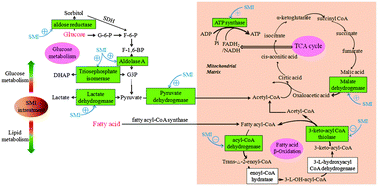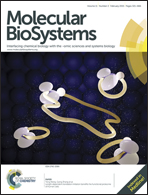A proteomic study of Shengmai injection's mechanism on preventing cardiac ischemia-reperfusion injury via energy metabolism modulation†
Abstract
Energy metabolism modulation plays an important role in protecting the heart from ischemia-reperfusion (IR) injury. Shengmai injection (SMI) is a Chinese medicine, which is widely used in China to treat ischemic heart diseases with speculated functions of modulating energy metabolism. To uncover the molecular mechanisms underlying the cardioprotective activity of SMI via the modulation of energy metabolism, a proteomic analysis was performed on ischemia-reperfusion (IR) injured hearts of rats in this study. Two-dimensional gel electrophoresis (2-DE) was used to measure the protein expression profiles of heart tissues. Differentially expressed proteins among groups were identified using matrix assisted laser desorption/ionization time-of-flight mass spectrometry (MALDI-TOF-MS/MS). Western blot analysis was used to validate differentially expressed proteins. Proteomic data revealed 14 major differentially expressed proteins that are related to the energy metabolism. It was found that the glucose oxidation, TCA cycle and ATP synthesis related proteins were consistently up-regulated in SMI treated rats, which is beneficial to aerobic respiration and ATP generation. In contrast, two proteins catalyzing fatty acid β-oxidation were down-regulated, implying the inhibition of this pathway to avoid high oxygen consumption. It is thus concluded that one of the major mechanisms of SMI protection against IR injury was modulation of the myocardial energy metabolism to improve cardiac efficiency through multiple metabolic pathways including stimulating glucose metabolism and inhibiting fatty acid metabolism. It provided potential protein targets for the therapeutic strategy through modulation of the myocardial energy metabolism.


 Please wait while we load your content...
Please wait while we load your content...